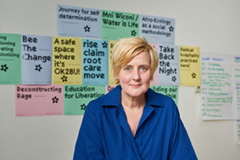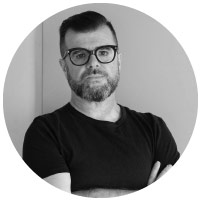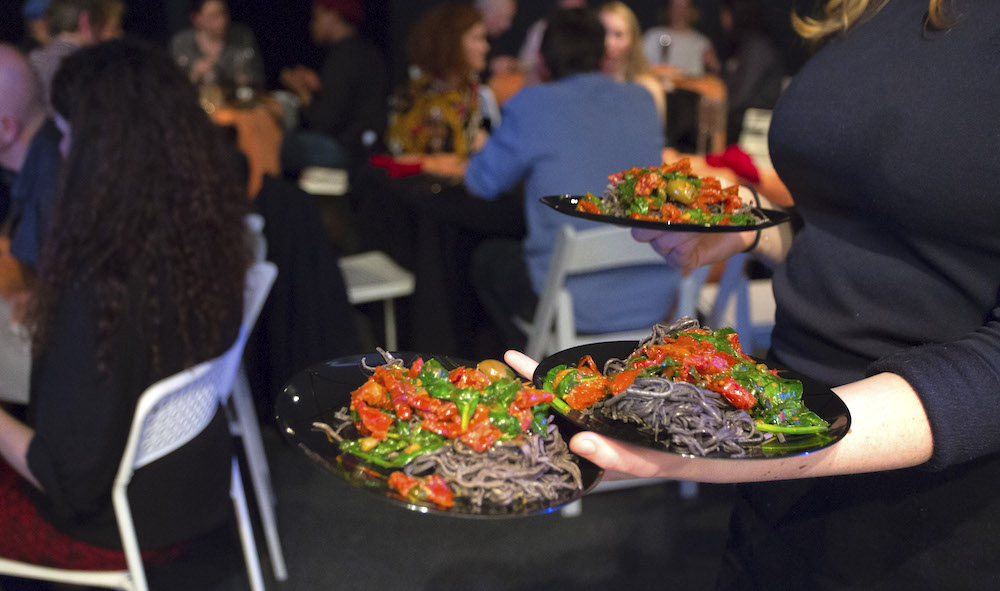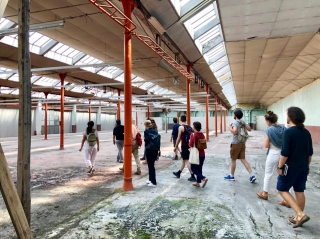UNIDEE LAB 2021: Tools And Technologies For Embedded Arts Practice | open call & selected residents
Building on the learning and conversations from 2020’s Embedded Arts Practice in a Postpandemic Future and 2021’s Groundwork for Embedded Arts Practice residencies, UNIDEE and Cittadellarte-Fondazione Pistoletto are pleased to invite applications for participation in a week-long ‘lab’ at Cittadellarte.
The lab will be an opportunity to share, unpack and apply your ongoing practice or action-research with a group of peers, the UNIDEE Residency Programs team and guests including artist Jeanne van Heeswijk (The Netherlands), curator, writer, artist and educator Paul O’ Neill (PUBLICS, Helsinki), artist, educator, researcher Mick Wilson (HDK-Valand, Gothenburg), and artist and curator Yvonne Carmichael (South Square Centre, Bradford).
Over the course of seven days of group critiques, facilitated workshops, collective trace-making, and informal and responsive activities we will make space in which you can gain multiple perspectives on the work you are undertaking in your locale, with a focus on identifying, testing and developing tools, technologies and methodologies that may be usefully applied in the situated contexts in which you are working.
The ‘embedded practice’ residencies in 2020 and 2021 brought together a broad range of practitioners from all over the world to share and develop their situated practices and action-research. In a time of changeable travel restrictions and social distancing measures, we found that residents valued the opportunity to share experiences of making socially-engaged work that is inextricably linked to its context and often relied on intimate connections and engagement with audiences, participants and collaborators.
Through group critiques, individual and collective trace-making, and handover sessions we found methods by which to share complex and sometimes overwhelmingly large-scale or long-term projects and praxis. Despite the specificity of the practices shared, we found there was benefit in temporarily taking them out of context and inviting fresh perspective to identify common themes, methodologies, approaches, and challenges. In our various (post-)pandemic contexts we also began to share experiences of (mis)using and applying ‘old’ technologies and emerging digital tools; from letters and postcards, to creative ‘hacking’ of conference call breakout rooms and screen sharing, to propositions for blockchain and cryptocurrencies to create fairer working conditions.
The Labs are an opportunity to continue this process together in presence.
We hope to reconnect and make new connections between practitioners and researchers who feel they would benefit from an intensive week of ‘putting their practice under the microscope’.
This will be done not so much to accelerate or ‘push forward’ projects, but rather as a way to ‘zoom in’ and get a better sense of the detail of the practice. The ‘what’ and the ‘how’ of the practice as well as the ‘why’.
We hope that this intimate collective examination will reveal the sometimes imperceptible movement and trajectory of such projects; helping each other over the humps and sticking points, as well as identifying potentially overlooked problems and obstacles in the road ahead.
At a broader level as ‘Socially Engaged Art’ continues to be increasingly recognised by the mainstream and institutional Artworld as a discipline (with accompanying commissions, educational courses and career paths) we might take this opportunity to reflect on how we can create shared resources and toolkits for embedded practice capable of disrupting the homogenisation and standardisation of such practice. How can we deterritorialize situated practice and keep it prickly? What can be shared, what transfers, what can be adapted and repurposed, what is specific and/or reliant on context? What tools and instruments can be hijacked or repurposed to do more than, in Audre Lorde’s words, temporarily beat the master at his own game (NOTE 1). What resources and tactics can we share to collectively dismantle the old world and forge new paths to exit the perennial crises of late capitalism? And beyond instrumentalisation, what other benefits might there be in taking time to share our concrete experiences and learn from one another? We hope in this way that the lab acts as a key step in Cittadellarte and Pistoletto’s commitment to developing a network of solidarity and common intent across disciplines, and of creating a global community of practice across our many locals.
The programme will be split into two sequential week-long labs for up to 8 residents each, with a seminar and handover session to link the two. The labs will take place at Cittadellarte-Fondazione Pistoletto using the UNIDEE Residency Programs space as a shared studio for group discussions, sharing sessions and presentations, with the opportunity for exploration and engagement with the postindustrial and rural landscapes of Biella.
The methods we will draw upon include group critiques - at which you will be expected to give a short presentation of the practice or action research you are sharing as part of the lab - as well as group exercises, workshops and less formal activities (group meals, walks etc.). At the end of the lab you will be asked to leave a trace of your experience as a basis for a handover with future residents.
Residents will stay in accommodation within Cittadellarte that includes basic cooking facilities.
Participants of Week One Lab will arrive on Sunday 7th November and depart Monday 15th November.
Jeanne Van Heeswijk will be guest facilitator of the sharing sessions for this week.
Participants of Week Two Lab will arrive by Friday 12th November and depart by Saturday 20th November.
Mick Wilson and Paul O’Neill, and Yvonne Carmichael will be guest facilitators of the sharing sessions for this week.
On Saturday 13th November there will be a seminar/symposium including presentations and panel discussions from the UNIDEE curatorial team and guests. This will also be an opportunity for the two cohorts to meet, take part in group discussions and handover their experiences.
There is a €280 fee for participation in the lab and accommodation (cleaning and sanitation) whilst in Biella. Participants will be required to arrange and cover their own travel to/from Biella and food/living costs whilst in Cittadellarte.
The UNIDEE programme thanks to the support of its partners is capable of keeping costs low for participants as our mission is to provide participants with the inspiration, motivation and tools to activate, develop or improve artistic initiatives based on the involvement of local ecologies.
We envisage a cohort of up to 16 participants in total, from a range of backgrounds and with diverse practices in the area of socially engaged art and social practice, curatorial practice, and community-organization.
The ongoing embedded practice you will share can be that which you developed during your residency, an extension of this or a related project. Selection will be based upon participants’ willingness and ability to share the practice they are engaged in, and collectively reflect upon this with peers. We will aim to select cohorts with a range of practices, location/perspective and experience.
Application is by Expression of Interest by filling out the application form with the following requirement:
• Indicate the weeks of preference of the one-week intensive.
• Up to 150 words about yourself and your practice and/or experience, and your suitability for the programme.
• Up to 200 words about the ongoing project or research that you will share as part of the lab including details about the local context (place, communities, audiences) and what long-term change you could hope to facilitate. The ongoing embedded practice you will share can be that which you developed during your previous UNIDEE residency, an extension of this, or a related project.
• Up to 150 words about how you may share this practice with others and what you hope to gain and learn from the week.
• CV / Portfolio in the same PDF (max 6 Mb).
Applicants must submit their application by email to: unidee@cittadellarte.it stating: “UNIDEE 2021 Lab application (your name)” as a subject line.
Deadline for submissions is Sunday 17th October and we will let successful applicants know a decision by Wednesday 20th October.

BIOGRAPHY
Jeanne Van Heeswijk is an artist who facilitates the creation of dynamic and diversified public spaces in order to “radicalize the local”. Her long-scale community-embedded projects question art’s autonomy by combining performative actions, discussions, and other forms of organizing and pedagogy in order to assist communities to take control of their own futures.
https://jeanneworks.net/

BIOGRAPHY
Dr. Paul O'Neill is an Irish curator, artist, writer and educator. He is the Artistic Director of PUBLICS, a position he took up in September 2017. PUBLICS is a curatorial agency and event space with a dedicated library, and reading room in Helsinki. Between 2013-17, he was Director of the Graduate Program at the Center for Curatorial Studies (CCS), Bard College, New York. He is author of the critically acclaimed book The Culture of Curating and the Curating of Culture(s), (Cambridge, MASS., The MIT Press, 2012), which has been translated into many languages. His most recent coedited book is Curating After the Global: Roadmaps to the Present is published with MIT Press, 2019.
Paul is widely regarded as one of the foremost research-oriented curators, and leading scholar of curatorial practice, public art and exhibition histories. Paul has held numerous curatorial and research positions over the last twenty years and he has taught on many curatorial and visual arts programs in Europe and the UK. Paul has co-curated more than sixty curatorial projects across the world including amongst recent others: We are the (Epi)center, P! Gallery, New York (2016), and the muti-faceted We are the Center for Curatorial Studies for the Hessel Museum, Bard College (2016-17), and the symposium Curating After the Global, at LUMA Foundation, Arles 2017 including a sited new commission with Emmanuelle Lainé.
He was visiting tutor on the de Appel Curatorial Program, Amsterdam from 2005-17, and was international research fellow with The Graduate School of Creative Arts and Media, Dublin between 2010-13. From 2007-2010, he was responsible for leading the major international research program looking at durational appraches to public art; Locating the Producers at Situations, University of the West of England, Bristol. He has previously held lecturing positions on the MFA in Curating, Goldsmiths, University of London and Visual Culture, Middlesex University amongst others. Between 2001-03, he was the Curator of London Print Studio Gallery. He was Artistic Director of Multiples X from 1997-06; an organization that commissioned and supported curated exhibitions of artist’s editions at Temple Bar Gallery, Dublin.

BIOGRAPHY
Mick Wilson is an artist, educator and researcher based in Gothenburg and Dublin, currently Professor of Art and Director of Studies for Doctoral Education at Hdk-Valand, University of Gothenburg. He was previously a Fellow at BAK, basis voor aktuele kunst, Utrecht, the Netherlands (2018/2019); Director of Valand Academy (2012-2018); Editor-in-chief PARSE Journal for Artistic Research (2015-2017); and founder Dean of the Graduate School of Creative Arts and Media, GradCAM (2008–2012). He recently convened the curatorial workshop “handfuls thrown into air and scattered over earth” as part of BB9: Farewell to Research June 2020.
https://exhibition.school/

BIOGRAPHY
Yvonne Carmichael, (born 1985, Lancashire, UK) is an artist, creative producer and Director of South Square Centre, a grassroots community and arts organisation in Bradford, where she has led on a community asset transfer to secure the use of the centre by the community for the next 99 years. Since 2013 Yvonne has also worked as associate producer for Beam - a public art agency – through which she has project managed award-winning permanent public art commissions including artwork in Bolsover, Chesterfield, Barnsley and Hull. Between 2014 – 2016 Yvonne was Creative Producer of Vespertine, a free cultural events programme in Unesco City of Media Arts York, which explored the creative use of new technologies in heritage spaces. The project was awarded ‘Best Cultural Partnership’ at the inaugural York Culture Awards in 2016. In 2012 she was a project activator at dOCUMENTA (13) in Kassel, Germany. Yvonne is also an alumni of the Unidee residency at Cittadellarte Fondazione-Pistoletto, which she completed in 2006.
PARTNERS
UNIDEE patrons are Regione Piemonte, Compagnia di San Paolo, CRT Fondazione Cassa di Risparmio di Torino, Creative Europe for "Alexandria (re)activating common urban imaginaries" and for "STARTS4Water", illycaffè S.p.A. and Fondazione Zegna
UNIDEE AIR partner: A.M. Qattan, Institut Français Italia
